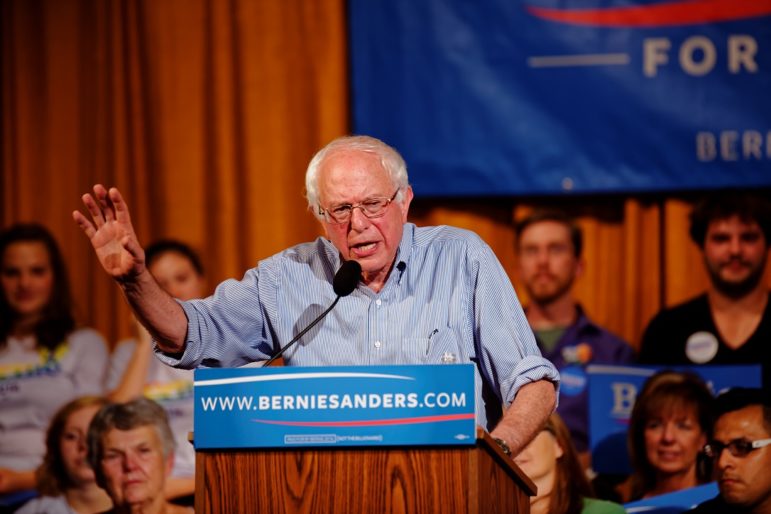
Michael Vadon
Todayt it's safe to say Bernie is not going to win. But some have been saying that since way before it was safe, or even fair.
The math is now clear: Unless something occurs to remove Hillary Clinton from the race, Bernie Sanders isn’t going to be the Democratic nominee for president in 2016.
The potential for an 11th-hour deus ex machina moment—courtesy of the Justice Department in the form of an emailgate indictment—was one reason Sanders campaigned over the past month or so as someone trying not just to send a message, but to actually win. Now that HRC has the delegates she needs, the slim possibility of that kind of dramatic plot twist is the sole (and pretty thin) justification for anyone thinking Sanders still has a chance to be on the November ballot.
Sanders told a California crowd Tuesday night that he plans to fight on, but word that he’ll lay off a lot of his staff suggests that his effort will now be aimed solely at shaping the Democratic party platform and apparatus, not at being its standard bearer.

No Backspace is City Limits' new blog featuring a recurring cast of opinion writers passionate about New York people, policies and politics. Click here to read more..
Even so, some Democratic party insiders will probably begin pressuring Sanders to officially get off the stage sooner rather than later. They’ll point to The Math. But like the boy who cried wolf, their previous efforts to shoo Sanders away—citing, yes, the arithmetic—will undermine the persuasive power of their pressure.
It isn’t just that New York Times columnist Ross Douthat declared in November that Sanders couldn’t win, or that a squad of centrist Democrats elaborated on that theme in December—before Sanders managed to totally derail a Clinton coronation. It’s that establishment voices started dimming the lights even after Bernie demonstrated that he was more than just a protest vote with a Brooklyn accent.
Back on March 21, it was reported that, “Democratic senators of all stripes are as impressed as they are surprised by Bernie Sanders’ insurgent campaign. But the time has come, they say, for Sanders to start winding things down.” That was before the contests in Idaho, Utah, Alaska, Hawaii, Washington, Wisconsin, Wyoming, Rhode Island, Indiana, West Virginia, Oregon, Montana or North Dakota – all of which Sanders won.
Then in April, we heard that “it’s now time for Sanders to depart from the contest and provide Clinton a few months to win over his supporters before the convention in July.” That was nearly two months before yesterday’s primaries in which 1.5 million people voted for Sanders.
Next was May 13—a couple weeks before Sanders leveraged his remaining in the race to force changes to the way the Democratic convention will be run:
“I don’t think they think of the downside of this,” said California Senator Dianne Feinstein, a Clinton supporter who hosted the 2008 meeting that brokered post-primary peace between Clinton and then-Illinois Senator Barack Obama. “It’s actually harmful because she can’t make that general-election pivot the way she should,” Ms. Feinstein said. “Trump has made that pivot.”
Sure, the people who’ve been ushering Sanders off the stage for months can treat today as an “I told you so” moment: They said he couldn’t win and, guess what?, he hasn’t won. But Sanders can make a counter-case that the drumbeat of dismissals undermined his case to voters that he was a viable candidate, costing him turnout and delegates.
Both arguments have some merit. But they are less important than what is undeniable: Because he ignored the sage advice of the Ross Douthats, Bill Daleys and Diane Feinsteins of the world, Sanders not only gave millions of voters the chance to vote for him, he also gave Democrats (and in some cases independents) in dozens of states an opportunity to cast meaningful primary ballots for Clinton in a contest that will ultimately produce the first major-party nomination of a woman.
The Vermont socialist may soon remove the capital “D” (for Democrat) that has been appended to his name over the course of this race, but his stubborn refusal to prematurely accept The Math has produced a welcome spring crop of small “d” democracy.









One thought on “It’s Time for Bernie To Drop Out. No Really. This Time We Mean It.”
Perhaps Jarrett Murphy is anxiously awaiting all the millions of Bernie Sanders supporters (who are half of the party) to drop out too. Maybe he’d like true #BernieOrBust Democrats (Big D) stay home during HRC’s coronation in Philadelphia.